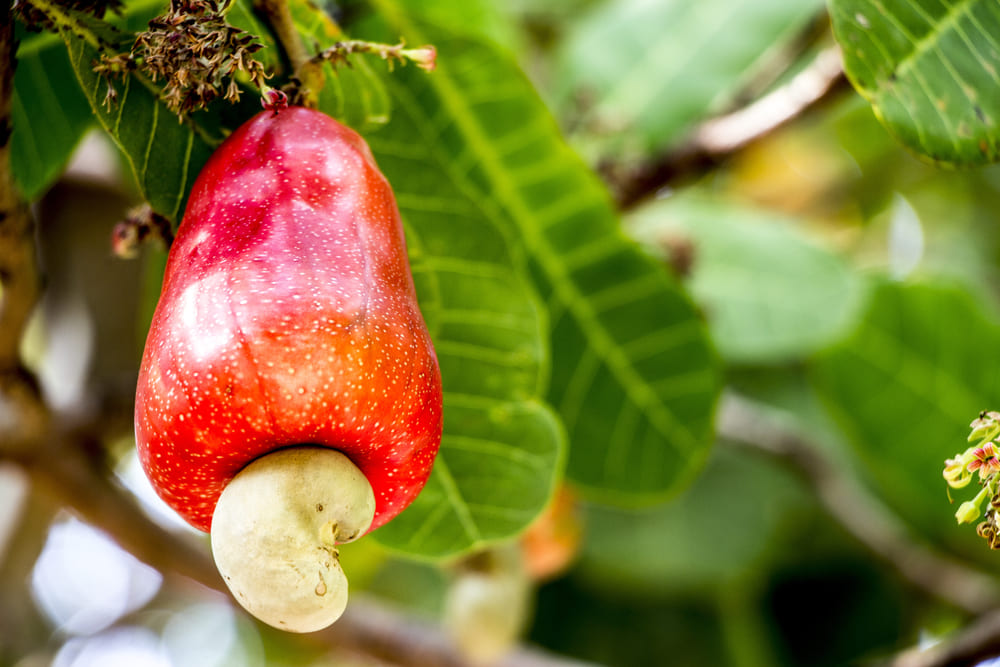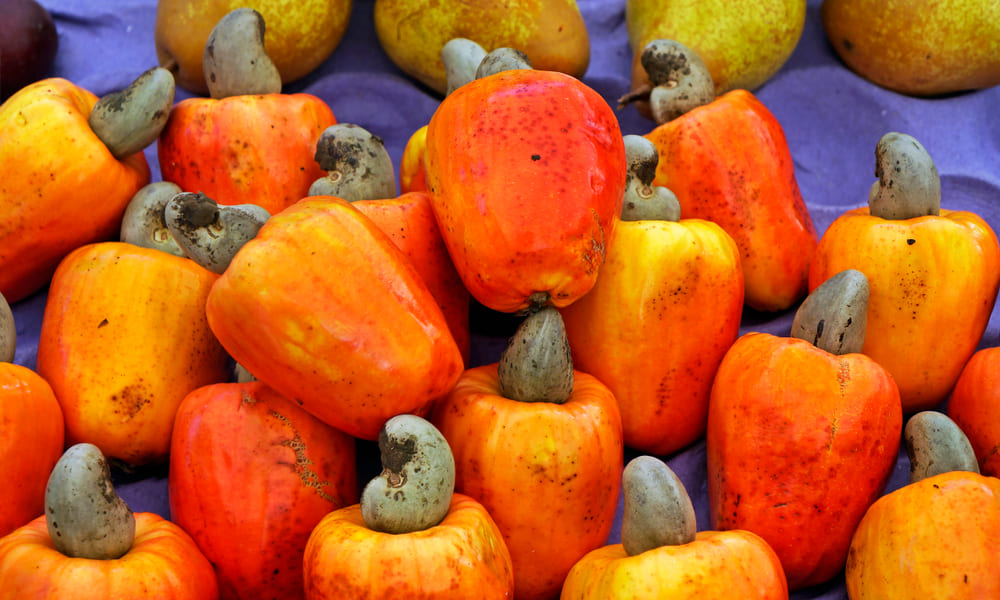Yes, you can eat cashew fruit! Cashew fruit is the edible juicy fleshy part of the cashew nut which has a sweet and tangy taste that resembles apples. They can be eaten raw, but their delicate flavor is best enjoyed when cooked or juiced.
The cashew nut itself is also edible and can be roasted, salted and served as a snack or used in various recipes. The oil from the cashews can be extracted to make an oil for cooking and baking.
Cashew fruit has a high content of vitamins and minerals such as vitamins A, E, C, potassium, magnesium, iron and zinc which makes it a great addition to any diet.

What Cashew Fruit Taste?
Cashew fruit is a unique, sweet and juicy delicacy from tropical places around the world, particularly Brazil. It has a distinctively sweet-sour taste that has been likened to an apple, mango or pineapple.
The flesh of this tropical fruit is pale yellow and soft in texture with an inner white seed that can be enjoyed as a snack or used to make preserves.
Cashew fruit is also renowned for its distinctive nutty aroma and flavor, which is extracted from the cashew nut shell. This unique flavor combines tartness from citrus with subtle sweetness and earthy nuttiness.
The creamy texture of the ripe cashew fruit combined with its nutty flavor makes it a great accompaniment to desserts or breakfast cereals.
All in all, the combination of flavors ensures that no two people will experience the cashew fruit in exactly the same way!
Nutritional Value Of A Cashew Fruit?
Cashew fruit is a nutritional powerhouse, packed with vitamins and minerals that are essential for our bodies to thrive.
It contains significant amounts of vitamins A, C, and E as well as magnesium and zinc. Cashew fruits also contain copper, manganese, and phosphorus. The high levels of vitamin A can help protect our eyes from damage due to sunlight and other environmental factors. Vitamin C helps boost our immune systems, while vitamin E offers protection against some forms of cancer.
Furthermore, high amounts of magnesium can improve bone health and promote muscle relaxation.
Finally, zinc provides an array of benefits including aiding in the creation of new cells, improving our skin health, increasing fertility rates in both male and female patients as well as helping to balance hormone levels in the body.
All these nutrients combined make cashew fruit one of the most nutritious snacks available.
Are There Any Adverse Effects of Consuming Cashew Fruits?
Consuming cashew fruits can have both positive and negative effects on our health.
Although cashews are packed with minerals such as iron, zinc, magnesium and manganese, they also contain lectins, phytic acid and high levels of oxalates which can reduce mineral absorption in the body.
Additionally, consuming raw cashews can cause adverse reactions in some people due to the presence of anacardic acid present in the fruit skin. This acid causes a burning sensation on the tongue when eaten raw and can even lead to throat irritation or bloating if consumed in large amounts.
Therefore, it is best to consume cashew fruits in moderation and after proper cooking or roasting to avoid any adverse effects from occurring.
How To Select and Store Cashew Fruits?

When selecting cashew fruits, it is important to choose ones that have an even-colored skin and are firm to the touch. In general, yellow or reddish fruits are ripe and ready for picking.
Avoid buying overripe cashew fruits as these are prone to spoilage. It is best to store cashew fruits in a cool, dry place and away from direct sunlight.
Once opened, it is best to keep them in the refrigerator or any other cool storage area. This helps prevent them from going bad quickly.
When storing them in a pantry or cupboard, be sure to keep them away from moisture and heat as this can reduce their shelf life significantly.
Additionally, check them often for signs of spoilage such as softness or mold growth so they don’t linger too long and go bad before use.
Conclusion
In conclusion, eating Cashew Fruit is a great way to get a variety of nutrients into your diet. While it does contain some sugar, it does not contain any fat or cholesterol, and contains high amounts of minerals like calcium and magnesium.
It also provides important vitamins like B-vitamins and vitamin C, as well as essential amino acids that are great for overall health.
Eating Cashew Fruit can be a great addition to any healthy diet, and can help provide essential nutrients while keeping unhealthy fats and sugars low.
